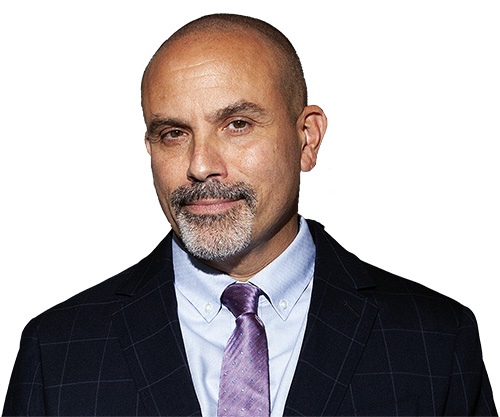Now is the time to elevate the voices of people living with HIV, and fight!
“You'd think one day we'd learn. You don't get anything unless you fight for it, united and with visible numbers. If ACT UP taught us anything, it taught us that.”
—Larry Kramer
The time to fight has once again come knocking on our door. In the dark early years of the AIDS epidemic in the United States, gay men and our allies found the strength to build a grassroots movement to empower ourselves and change the national conversation. ACT UP was the juggernaut that forced our government’s response to the epidemic and ultimately saved an untold number of lives. Ours was a community-led response when it seemed no one was listening. Over time, the paradigm shifted to a celebrity-fashioned response. It became a normal fixture in pop culture to join the fight against HIV/AIDS—witnessed by the high-profile names of Elizabeth Taylor, Reba McEntire, Kenneth Cole, and Bono. It was a young boy from Indiana named Ryan White who helped change the narrative, too. Yet today, far fewer Red Ribbons are visible on celebrity lapels during red carpet awards ceremonies, but that isn’t to say the voices have gone away. The pendulum has indeed swung back to the grassroots community, and if recent events are any indication, there is no better time than the present to elevate the patients’ voice for advocates and activists alike. The time to fight is now!
Look no further than the public health crisis unfolding in the Volunteer State. Tennessee’s MAGA-aligned Republican Governor, Bill Lee, has clearly put politics over public health with his decision to reject federal funding for HIV-related prevention services. In what amounts to a thinly veiled attack on abortion rights and gender-affirming care, Lee’s office issued a statement saying, “These arrangements were made under prior administrations, and this administration is examining areas where it can decrease its reliance on federal funding and assume increased independence.” The problem is that HIV-related prevention services have become collateral damage, and there is nothing to say that HIV-related treatment services won’t be next.
MAGAism has never been aligned with facts or logic, and Lee’s statement is yet another example of the danger that lurks behind this populist movement. How can Tennessee expect to pick up the tab for an additional $9 million in lost federal funding? The truth is that the funds being abandoned for the sake of MAGA talking points do more than just prevent HIV; they provide the funding for disease surveillance, as well—something that Tennessee desperately needs. The funds for HIV surveillance are inextricably linked with the surveillance and treatment of other sexually transmitted infections.
Since 2019, when Lee first moved into the Tennessee Residence, the state has seen a steep rise in sexually transmitted infections (STIs). According to the Centers for Disease Control & Prevention (CDC), Tennessee’s incidence and rates of syphilis steadily rose from 1,730 cases in 2018 to 2,433 cases in 2020; incidence and rates of gonorrhea increased from 14,666 cases in 2018 to 18,288 cases in 2020; and incidence and rates of chlamydia swelled from 38,282 cases in 2018 to 41,501 cases in 2019. Sadly, but not surprisingly, communities of color in Tennessee have been the hardest hit. For example, infection rates for HIV are exponentially higher in Black and Hispanic populations per 100,000 (Blacks, 32.4; Hispanics, 12.0; Whites, 3.9).
Local advocates in Tennessee have already sounded the alarm, and they are being joined by local politicians, community-based HIV/AIDS organizations, religious entities, and LGBTQ organizations. The politics on the ground make it difficult for the HIV stakeholders trying to improve Tennessee’s public health infrastructure. Lessons can be learned from what the harm reduction community did in the neighboring red state of North Carolina: target Republican members of the state general assembly and make them allies, rather than foes.
Government isn’t the only institution constructing barriers that make accessing healthcare and supportive services for patients more difficult. Earlier this year, one major pharmacy retailer announced that it would not distribute the abortion pill, mifepristone, in 20 states. Abortion remains legal in many of those states—including Kansas, where voters overwhelmingly rejected a ballot initiative last year that would have made it illegal. In a widely criticized move—made in response to MAGA-aligned Republican states attorneys general in those states—concerns have been expressed it will likely contribute to existing health disparities.
The CDC recently reported that the maternal death rate in the U.S. rose sharply in 2021, and disproportionately impacts Black mothers. In 2021, 1,205 women died of causes related to maternal health, representing a nearly 40% jump from the previous year. Black women were 2.6 times more likely to die from maternal causes than White women. Does anyone really think that the decision to limit access to mifepristone will impact women from different races the same way? Black and Brown women will experience even more maternal-related hardship if this decision stands.
Any pharmacy retailer restricting access to a prescription medication authorized by the U.S. Food and Drug Administration starts down a very slippery slope. Whereas mifepristone is a pill used in abortion care, what is to say those same 20 states' attorneys general don’t shift their dogmatic focus onto restricting access to testosterone or estrogen in an attempt to undermine gender-affirming care for trans folks (Texas and Missouri are already moving in this direction), or limiting access to Truvada or Descovy for pre-exposure prophylaxis (PrEP) against HIV, as a way of moralizing medical care to reduce what they view as promiscuous sexual behavior by consenting adults (and there is already such litigation sitting before the courts), or preventing the use of methadone because they consider it as promoting drug use.
Before you say it will never happen, do you remember what this country looked like before June 24, 2022? It was a time when would-be Supreme Court nominee Neil Gorsuch said in 2017, Brett Kavanaugh said in 2018, and Amy Coney Barrett said in 2020: Roe was the settled law of the land. When political pundits pontificate that elections matter, look no further than the Dobbs decision.
The HIV community has a vested interest in exerting influence on any commercial entity caving to MAGAism by taking their business elsewhere. In reality, pharmacies make a lot of money off patients living with chronic health conditions who require Level or Tier 5 prescription medications, or what are commonly referred to as specialty medications. These medications are expensive! Consumers—and that includes those of us living with HIV/AIDS—have the power to influence these decisions with our wallets and pocketbooks.
But people who think that these decisions only impact abortion or gender-affirming care have also ironically experienced barriers themselves as they’ve tried to access healthcare services. Nothing comes between the patient-doctor relationship more than the devious “cost containment” strategies employed by the greedy insurance industry: utilization management, prior authorization, and step therapy.
According to Ranier Simons, MHI, an independent healthcare analytics and strategy consultant, these cost containment strategies result in poor patient outcomes, increased expenditures with resulting patient hospitalizations, treatment abandonment, and later-stage acute treatment utilization. Simons summarized:
“Unfortunately, many standard healthcare cost-benefit analyses do not benefit patients. They benefit profit. One such practice is Prior Authorization, and it is part of what insurance companies and other medical payers refer to as utilization management. Simply put, when a medical professional orders a procedure, modality, or medication, it is not automatically paid for by a patient’s insurance. Depending on the structure of the health plan, approval is required before an action is taken to guarantee it is covered by the insurance. If prior authorization is not obtained, the patient and/or healthcare practice could face being required to pay full price out of pocket or healthcare providers not receiving reimbursement. Additionally, if a prior authorization is denied, that means the health plan will not pay and the patient is still faced with the question of paying full fees or forgoing prescribed treatment.”
Sometimes, patient advocacy requires an audible. The National Association of Insurance Commissioners (NAIC) has escaped the wrath of the HIV community and the likes of ACT UP, and maybe that needs to change. NAIC represents the chief insurance regulators of the 50 states, the District of Columbia, and the U.S. territories. Each state grants several powers to insurance commissioners—including approval of insurance rates, licensing requirements, and claims handling. Insurance commissioners are elected by voters in 11 states, appointed by the governor in 37 states, and appointed by independent commissions in two states. In other words, depending on where you live, it is entirely possible to activate grassroots advocacy and activism to not only weigh in on the decisions being made by this public official but also influence who occupies the office itself.
Collectively, right now, it feels like a tsunami is battering our community. The dangerous politically motivated laws and policies aren’t simply focused on women or our trans brothers and sisters; they’re much broader and continually reduce access to care and treatment for people living with HIV/AIDS. Don’t expect the trend to change unless we decide to change it!
Many of the red states most heavily influenced by cancerous MAGAism have “Stand Your Ground” laws designed to remove the duty to retreat in some cases of self-defense that allow for a citizen’s use of force as self-defense in certain situations. Larry Kramer taught us, “You don't get anything unless you fight for it.” It is our time to fight, again. We cannot retreat in our self-defense of our rights! Our tools in this fight aren’t hiding behind a deadly weapon, yet they’re even more impactful. We have the power to mobilize, educate, protest, boycott, volunteer, and maybe most importantly, vote! Forty years ago, ACT UP created the framework. Today, we must construct the barricade that will stop the tsunami.

Brandon M. Macsata is widely recognized for his ability to connect stakeholders interested in influencing public opinion and public policy at the national and state levels. He has extensive experience working with political candidates, national and statewide trade associations, issue-advocacy groups and other corporate entities. He is a 20-year long-term survivor. He resides in North Carolina, with his son, Sebastian.


